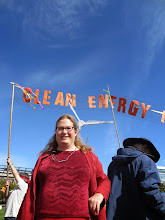Rationale
for a Local Participation Requirement in Shared Renewables Projects
The vision we are working towards at the Solar
Gardens Institute in many ways is similar to that of Amory Lovins of the Rocky
Mountain Institute: distributed
renewables and storage, owned locally by those who use the power. http://www.rmi.org/keysolutionselectricity2 In
the long run, each feeder line can become a microgrid, with the ability to
island and be self-reliant during a failure of the larger grid or extreme
weather http://blog.rmi.org/blog_2013_01_10_microgrids_providing_safe_harbor_in_a_storm
. Each microgrid can have up to double
the solar capacity it needs in order to export to areas experiencing
cloudiness, while requiring little additional long distance transmission (thus
a local ownership requirement of about 50%, rather than 100%).
I can give you the small-town dweller's
perspective on this. I live on a small island (Orcas, pop. 4000) off the
coast of Washington State. Before that I lived in the San Luis Valley,
with even smaller communities. I have also done presentations and worked
projects in many other rural areas.
There is a lot for a city person to learn when they move to these
places, it takes at least a few years to “get it”.
Of course in small towns it's hard to get
agreement on anything. But what they do agree about is self-reliance.
Everyone everywhere wants to produce and use power locally, from transition
town advocates to the most rock-ribbed county commissioner. There is also
a controversy around the scale of power export - projects where the power is
going somewhere else are often opposed for environmental or aesthetic reasons.
Every small town I've ever been involved with has
had issues with money supply. Money tends to leave the area and not come back -
especially for large recurring expenses like food and electrical power.
"Buy local" and local currency campaigns are everywhere,
seeking to leverage the multiplier effect when a dollar changes hands several
times.
In the economic analyses we have seen and
performed, we have found solar installation produces few and short-term jobs in
comparison to fossil fuel extraction and generation. Land lease and
property tax revenues are of necessity small compared to electricity and
renewable incentive income - otherwise the projects would never be built in the
first place. Local ownership of renewables brings triple the community
benefit of absentee-owned systems - http://www.ilsr.org/ownership-and-money-cure-nimby/
While it does cost more per watt to build local
power, rural areas have greater access to grants that can help level the
playing field. Solar economies of scale are fairly small for systems larger
than 10 kilowatts http://www.ilsr.org/distributed-small-scale-solar-competes-large-scale-pv/ and http://www.ilsr.org/solar-economies-scale-update/ ...
Mass-produced, plug and play small systems have their own economy of scale
which may eventually overcome that of large custom systems as fixed
interconnection, financing, and permitting costs come down. Very large systems have certain diseconomies
of scale http://www.ilsr.org/solar-diseconomies-scale/ -
most particularly the cost of transmission to bring the power to market, which
is externalized by solar developers to utilities and ultimately all power
customers.
The best information on this comes from Ceal
Smith of the Renewable Communities Alliance ( http://www.renewablecommunities.org/)
and John Farrell of the Institute for Local Self-Reliance ( http://www.ilsr.org )
Thanks again! Please feel free to ask me any
questions you may have,
Joy Hughes
719-207-3097


Great article Joy, I cannot stress the importance of conveying this message enough.
ReplyDeleteHere's an article I wrote about the benefits of community-based renewable energy generation: http://www.communitypowerreport.com/2012/09/community-power-renewing-communities.html.
Hope to stay in touch.